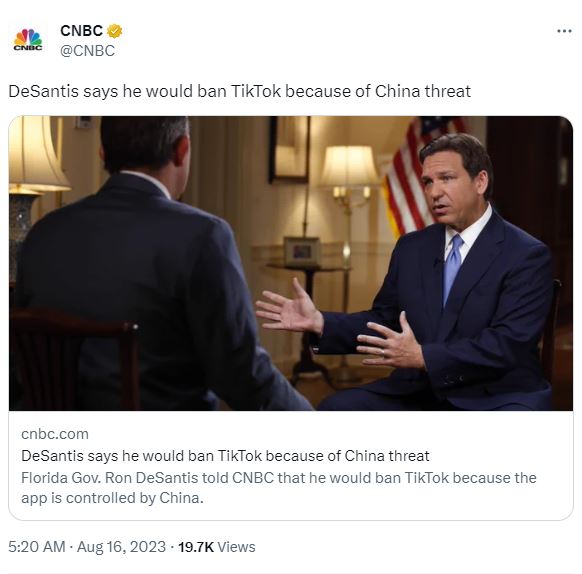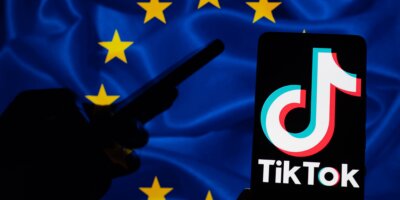
TikTok continues to highlight that it has not shared and will not share US user data with the Chinese government. (Image – Shutterstock)
New York City the latest in US to ban TikTok on government devices
- New York City announces a ban on TikTok for government devices.
- States agencies have 30 days to remove app.
- TikTok continues to insist that it does not share US data with China.
New York City has become the latest in the US to ban TikTok on government devices. Citing security concerns, New York joins a list of several other states in the US that have banned the Chinese-owned social media app.
According to a report by Reuters, New York City Mayor Eric Adams said in a statement that TikTok “posed a security threat to the city’s technical networks.” The city has required all agencies to remove the app within 30 days. Interestingly, New York state had already banned TikTok on state-issued mobile devices for more than three years, with some exceptions.
Earlier this year, Montana became the first state in the US to pass a law to ban TikTok on all devices in the state. Some content creators are suing the state to block the ban.
TikTok continues to emphasize that it has not shared and will not share US user data with the Chinese government. The social media app has also taken significant measures to protect the privacy and security of TikTok users.
There are currently about 80 million active TikTok users in the US, with Gen Zs making up 60% of users. TikTok’s revenue in the US is also one of the highest. In the year 2000, the company generated about US$500 million in revenue.
While some content creators continue to protest calls for a full TikTok ban in the US, a new poll by Reuters and Ipsos showed that close to half of American adults support a ban on the Chinese-owned social media app TikTok.
Results from the poll showed that 47% of the respondents said they at least somewhat supported “banning TikTok from use in the United States,” while 36% opposed a ban and 17% said they didn’t know. Another breakdown showed that 58% of Republicans favored a ban, compared to 47% of Democrats.

More calls for TikTok to be banned in US.
For context, the call for a TikTok ban in the US started when former US President Donald Trump sought to bar new downloads of TikTok in the year 2000. However, a series of court decisions blocked the ban from taking effect. Since then, more leaders in the US have called for the app to be reviewed or banned.
FBI director Christopher Wray told a committee hearing in March this year that China’s government could use the social media platform to control software on millions of devices, while CIA Director William Burns said that China’s government could use TikTok to control software on millions of devices and drive narratives to divide Americans.
In March this year, TikTok CEO Shou Zi Chew’s testimony before Congress did little to assuage U.S. worries over TikTok’s China-based parent company ByteDance and added fresh momentum to lawmakers’ calls to ban the platform nationwide.
TikTok ban outside of the US
It remains to be seen if TikTok will face a full ban in the US. However, several other countries have also banned the app from being used on government devices. Some countries have even banned public access to the app.
In Asia Pacific, Australia and New Zealand have banned TikTok on government devices. India was one of the first countries to ban TikTok permanently in January 2021. According to reports, the ban came after a dispute between India and China. Apart from TikTok, India has also banned several other Chinese social media apps and even mobile phone games, citing espionage and security concerns.
Taiwan also introduced a government device ban in December and has been considering a larger ban on the app amid tensions with China over its stated independence.
In Southeast Asia, Indonesia had initially banned the app citing pornographic content as the reason but lifted the ban after coming to a censorship agreement with TikTok.
The EU has also banned TikTok on government devices, while the UK and Canada have also joined the list of countries banning the social media app on government devices.
What can TikTok do?
In June this year, TikTok released a statement on its privacy and data security practices. The statement was meant to set the record straight about the information it collects and how the information is used, shared, and protected.
On location and GPS data, TikTok stated, “The TikTok app is not unique in the amount of information it collects. In line with industry practices, we collect information that users choose to provide to us and information that helps the app function, operate securely, and improve people’s experience. In certain regions such as the United States, Australia, and South Korea, the current versions of the TikTok app do not collect precise or approximate GPS information from users.”
On keystrokes, the social media company said it collects certain keystroke patterns or rhythms for security and performance-related purposes, such as verifying the authenticity of an account, risk control, debugging, troubleshooting, and monitoring for proper performance.
The app also stated that it does not use face or voice data to uniquely identify someone. “We collect and use face and voice information for filters and effects, for safety and user experience, to recommend and moderate content, and for analytics and demographic classification, such as inferred age range,” it stated.
However, all this may not be enough as the app continues to face challenges and could eventually face a full ban in the US in the near future.
READ MORE
- Data Strategies That Dictate Legacy Overhaul Methods for Established Banks
- Securing Data: A Guide to Navigating Australian Privacy Regulations
- Ethical Threads: Transforming Fashion with Trust and Transparency
- Top 5 Drivers Shaping IT Budgets This Financial Year
- Beyond Connectivity: How Wireless Site Surveys Enhance Tomorrow’s Business Network


